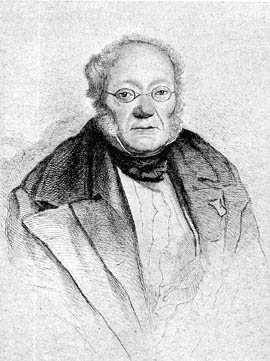François Habeneck facts for kids
François Antoine Habeneck (born January 22, 1781 – died February 8, 1849) was a French violin player and conductor. He helped introduce the music of Ludwig van Beethoven to France.
Contents
Early Life and Training
François Antoine Habeneck was born in Mézières, France. His father was a musician in a French army band and taught him music from a young age. By the time he was ten, François was already performing concertos in public.
In 1801, Habeneck joined the Conservatoire de Paris, a famous music school. He studied the violin with Pierre Baillot and won the top prize for violin in 1804. That same year, he joined the orchestra at the Opéra-Comique, a theater for comic operas. Soon after, he moved to the bigger Paris Opera orchestra. He also started leading student concerts at the Conservatoire from 1806.
Career at the Paris Opera
Habeneck's career at the Paris Opera grew steadily. On June 1, 1817, he became an assistant conductor. He later became a joint first conductor with Henri Valentino in 1824. When Valentino left in 1831, Habeneck became the main conductor. He held this important role until he retired in 1846.
During his time as conductor, Habeneck led the first performances of many famous operas. These included Robert le diable, La Juive, Les Huguenots, and Benvenuto Cellini. He was known for his dedication to the music.
Concerts, Compositions, and Students
In 1828, Habeneck helped start the Orchestre de la Société des Concerts du Conservatoire. He became its first conductor. Through these concerts, he played a big part in bringing Beethoven's amazing symphonies to France. This was very important because Beethoven's music was not well known there at the time.
Habeneck also wrote his own music, including two concertos and pieces for the violin. However, he only published a few of his works. He was also a respected teacher. Some of his famous students included Jean-Delphin Alard, Hubert Léonard, Léon Le Cieux, and Édouard Lalo.
Habeneck and Richard Wagner
The famous composer Richard Wagner had a strong opinion about Habeneck. While some, like Hector Berlioz, criticized Habeneck's conducting, Wagner praised him. Wagner arrived in Paris in 1839, hoping to become a successful composer. He met Habeneck, who was kind and willing to help.
Wagner later recalled a performance of Beethoven's Ninth Symphony led by Habeneck. This performance was a huge moment for Wagner. He felt he truly understood the symphony for the first time. Wagner believed Habeneck succeeded because he worked hard to make the orchestra understand the "melos" of the music. Melos means the singing quality and flow of the melody. Habeneck made the orchestra play the music in a way that made it "sing."
This experience deeply influenced Wagner. He wrote about it in his essays, explaining that a conductor must bring out the melody clearly. He felt that French musicians, trained in a style that valued melody, were especially good at this. Habeneck's approach became a model for conductors in the 19th century and beyond.
François Antoine Habeneck passed away in Paris in 1849.
| Preceded by none |
Principal conductors, Orchestre de la Société des Concerts du Conservatoire 1828–1848 |
Succeeded by Narcisse Girard |
See also
 In Spanish: François-Antoine Habeneck para niños
In Spanish: François-Antoine Habeneck para niños
 | Madam C. J. Walker |
 | Janet Emerson Bashen |
 | Annie Turnbo Malone |
 | Maggie L. Walker |


